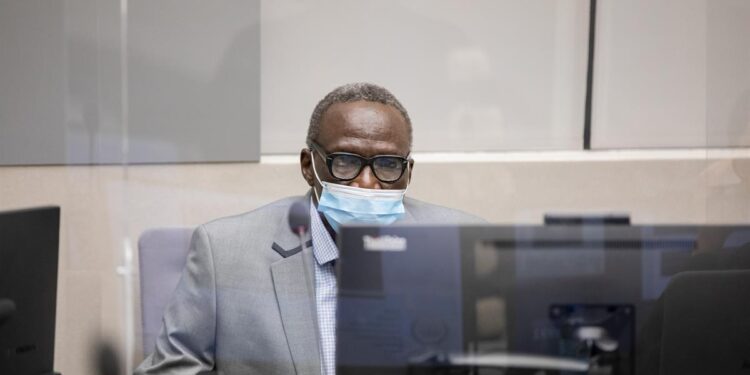By Janet Sankale
The International Criminal Court (ICC) in The Hague will begin hearings on the confirmation of charges in the case of The Prosecutor v. Ali Muhammad Ali Abd- Al -Rahman on Monday, 24, 2021.
The confirmation of charges phase is not a trial, but a pre-trial hearing. The purpose of a confirmation of charges hearing is to establish if there are substantial grounds to believe that the person has committed the alleged crimes. If the charges are confirmed, the case will enter the trial stage. The prosecutor, the defence, the legal representatives of the victims will make oral submissions before the judges to present their arguments on the merits.
The prosecution is required to support each of the charges with sufficient evidence to establish substantial grounds to believe that Abd-Al-Rahman committed the crimes with which he is charged. The defence may object to the charges, respond to prosecution evidence and present exculpatory evidence
Mr Abd-Al-Rahman is an alleged former commander of the Janjaweed militia. He is suspected of 31 counts of war crimes and crimes against humanity allegedly committed between August 2003 and at least April 2004 in Darfur, Sudan.
On April 27, 2007, the Office of the Prosecutor of the ICC issued the first arrest warrant against Abd-Al-Rahman, accusing him of 50 counts. The ICC’s Pre-Trial Chamber I reviewed the prosecutor’s application in accordance with Article 58(7) of the Rome Statute (RS). According to Article 58(1)(b) of the Rome Statute, the chamber considers that based on evidence and information provided by the prosecution and without prejudice to any challenge to the admissibility of the case, under article 19(2)(a) and (b) of the Statute and without prejudice to any subsequent determination, the case against Abd-Al-Rahman falls within the jurisdiction of the Court and is admissible.
The judges were satisfied that there are reasonable grounds to believe Abd-Al-Rahman was one of the most senior leaders in the tribal hierarchy in the Wadi Sahil locality and that he commanded thousands of Janjaweed militiamen in attacks and the killings of civilians in four villages (Kodoom, Bindisi, Mukjar, and Arawala), destruction of property, rapes, forcible transfer of population, persecution, inhumane acts and pillaging. Those alleged crimes are described in 22 counts of crimes against humanity and 28 counts of war crimes between August 2003 and March 2004.
On June 11, 2020, the prosecutor filed an application for amendment of the arrest warrant in accordance with Article 58(6) of the Rome Statute and issued a second warrant of arrest for Abd-Al-Rahman by adding 3 new crimes. The prosecution submits, that in addition to the crimes for which the first warrant of arrest was issued, Abd-Al-Rahman is also criminally responsible for the crime of murder as a crime against humanity and war crime and other inhumane acts as a crime against humanity against at least 100 civilians in Deleig and surrounding areas.
According to the second corrected version of the Document Containing the Charges (DCC) submitted by the prosecutor on April 22, 2021, the total of 50 counts in the first arrest warrant in 2007 and the second arrest warrant in 2020 where 3 more counts were added. Those counts were reduced to 31 counts.
- Counts 1-11 concern crimes committed in Kodoom, Bindisi and surrounding areas in August 2003,
- Counts 12-21 concern crimes committed in Mukjar and surrounding areas in February -March 2004, and
- Counts 22-31 concerns crimes committed in Deleig and surrounding areas in March 2004.
Abd-Al-Rahman voluntarily surrendered in the Central African Republic and was transferred to the ICC custody on June 9, 2020. Upon his arrival at the Detention Unit of the ICC, the Pre-Trial Chamber II held an initial appearance hearing on June 15, 2020, to verify the identity of the suspect and ensure that he was informed of the charges against him and his rights under the Rome Statute. He remained in detention after Pre-Trial Chamber II denied his request for interim release. The chamber considered it necessary for the integrity of the investigation and the proceedings and safety of the witness.
The United Nations Security Council (UNSC) referred the situation in Darfur in accordance with its Resolution 1593. The Government of Sudan and all other parties to the conflict in Darfur shall cooperate fully with and provide any necessary assistance to the prosecutor pursuant to this resolution.
As of Monday, May 24th, the ICC will open its first major hearings on Darfur crimes. The hearing is scheduled from 24 to 27 May 2021 before the Pre-Trial Chamber II composed of Judge Rosario Salvatore (Presiding judge), Judge Antoine Kesia-Mbe Mindua and Judge Tomoko Akane. The judges will confirm all or some charges if they are satisfied that there are substantial grounds to believe that the accused is guilty. That is a higher threshold than the reasonable grounds at the arrest warrant stage. If the case is sent for trial, the prosecution will have to prove beyond reasonable doubt that the accused is guilty, an even higher threshold. If there is insufficient evidence, judges also decline to confirm those charges and stop the proceedings against Abd-Al-Rahman, adjourn the hearing and request the prosecutor to provide further evidence, to conduct further investigation or amend any charge for which the evidence submitted appears to establish a crime other than the one charged was committed.







